Johnnie To’s The Heroic Trio/Executioners (1993): Criterion Blu-ray review
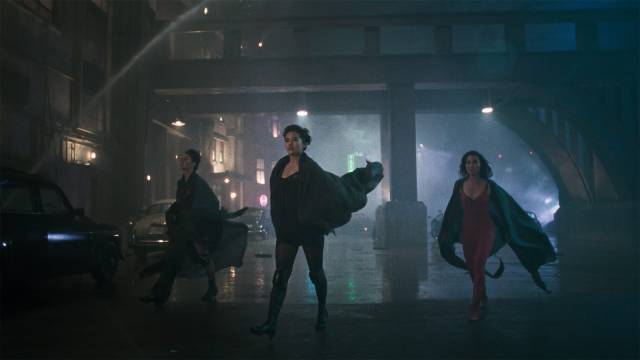
There’s a tradition in Chinese cinema of strong female characters engaged in action and political intrigue, going back at least to the mid-’60s and King Hu’s groundbreaking Come Drink With Me (1966), made for Shaw Brothers, and the subsequent series of genre-defining wuxia movies he made independently up to the end of the ’70s. By that time, period martial arts were being supplanted by contemporary action centred on cops and criminals, a context which was less accommodating to the action skills of women – the past had added a touch of fantasy which made it easier to accept women as the physical equals of men. In the new action genre, female stars often found themselves filling more comical supporting roles, at least at first; but certain stars carved out convincing positions for themselves even in a comedy context through their displays of physical prowess in hair-raising stunts and bone-crunching martial arts combat.
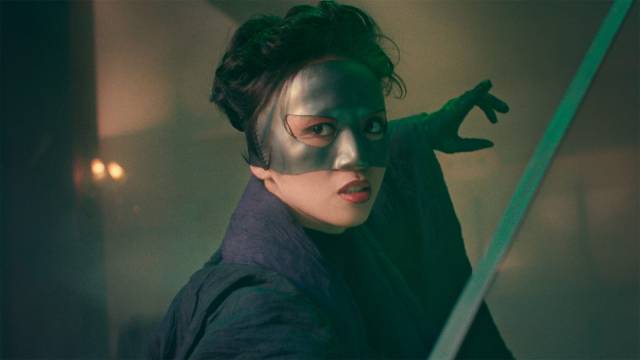
By the turn of the decade, the Hong Kong film industry was beginning to feel the stress of the approaching hand-over from British rule to Chinese control, a change whose impact was as yet unclear. It was around this time that the industry turned again to the past – both relatively recent, with Tsui Hark’s Once Upon a Time in China series, which dealt with Chinese nationalism in the face of European imperialism, and more distant, with historical epics rooted in China’s turbulent dynastic history and martial arts romances like The Swordsman (1990, produced by Tsui Hark and co-directed by King Hu) and The Bride with White Hair (Ronny Yu, 1993).
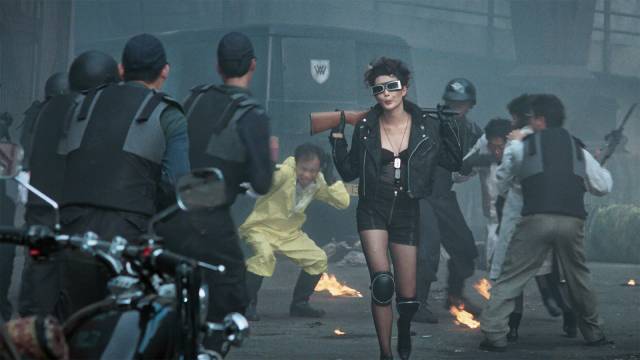
It was in this context that prolific film and television director Johnnie To, some years before finding international success with a series of cool, stylish crime thrillers, made a pair of movies which blended multiple genres and influences – unease about Hong Kong’s future and the weight of Chinese history, contemporary action and historical fantasy, martial arts and western superheroes in the Gothic mode of Tim Burton’s recent Batman (1989). And he built these movies around three of Hong Kong’s biggest female stars, all with very different screen personas. Michelle Yeoh, trained in ballet, was a prominent action star; singer-actress Anita Mui was a romantic lead; while Maggie Cheung had most frequently been cast as a ditzy foil for male heroes, though this began to change when she was cast in films by Wong Kar-Wai and Stanley Kwan.
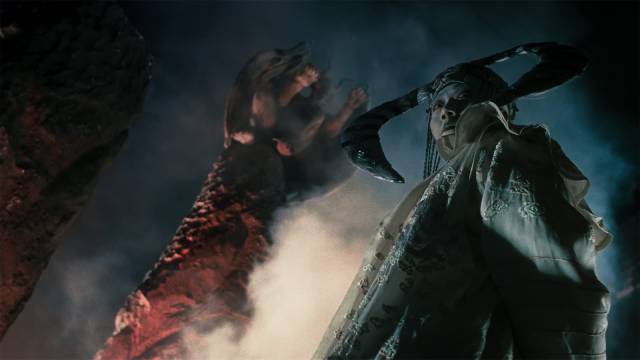
The Heroic Trio (1993), scripted by Sandy Shaw, produced and directed by To, with action choreography by Ching Siu-Tung, is full of darkness which pulls against playful, comic-book elements. In a dank city (reminiscent of Gotham on a budget), someone has been kidnapping newborn babies (eighteen so far) and the police chief has just received a warning that his own child is next. Despite extra security at the hospital, an invisible force grabs two babies from the nursery. As the babies float out of a high window, a masked figure appears rushing across power lines and tossing small ninja blades which apparently wound the invisible attacker. This is Wonder Woman (Anita Mui), who manages to save one of the babies, while the other is whisked away.
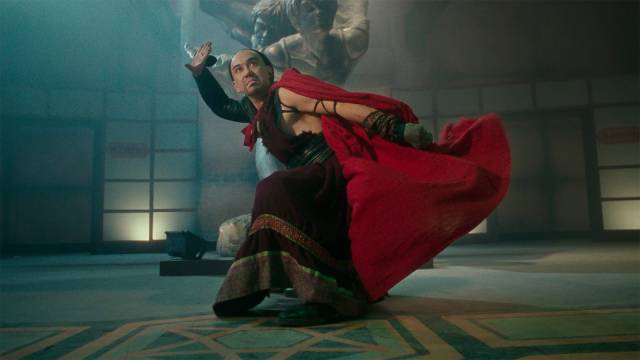
These babies are being stolen by Invisible Woman (Michelle Yeoh), who is under the control of Evil Master (Yen Shi-Kwan), a powerful eunuch who is determined to restore China’s Emperor. In flashbacks, we learn that Invisible Woman is Ching, one of two children being trained by an unforgiving martial arts master; the other is Chat (Maggie Cheung), who is now a mercenary bounty hunter. Wonder Woman is actually Tung, married to Inspector Lau (Damian Lau), the cop in charge of the case.
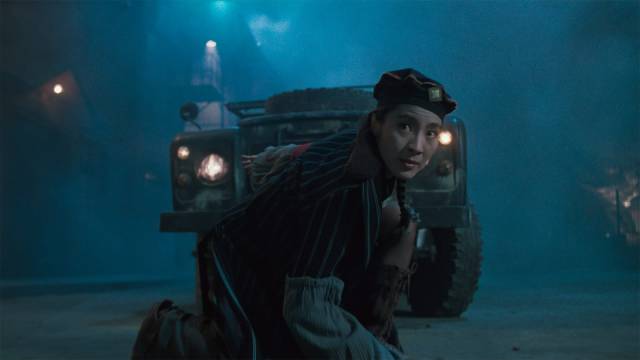
As the police are completely ineffectual, it’s up to the women to fix things – Chat and Tung team up, initially going up against Ching, but eventually allying with her to defeat the Evil Master and his demonic henchman Kau (Anthony Wong). There are multiple complications – Ching loves the inventor of her invisibility cloak (James Pax), who is becoming increasingly sick from his toxic work, while her boss threatens to kill him as soon as his work is complete; Chat kidnaps a baby to prevent it falling into Ching’s hands, but it ends up dying during a fight between the three women. This serious child endangerment is perhaps the biggest difference between the movie and its western influences.
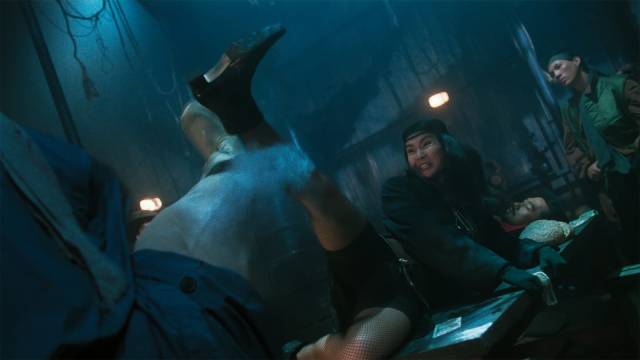
There are also a group of discarded children in Evil Master’s underground lair who squat in squalor and cannibalize one another, so far gone that towards the climactic confrontation Chat tosses a grenade among them to put them out of their misery. To those used to Hollywood action movies, this kind of casual brutality towards children is unsettling and complicates identification with the heroines even as they fight against the even more casually brutal eunuch.
The blend of Chinese fantasy and western influences comes to a head when the Evil Master emerges from fire as a walking skeleton which echoes the climax of The Terminator (1984), with perhaps a touch of Ray Harryhausen’s animated skeletons from The 7th Voyage of Sinbad (1958) and Jason and the Argonauts (1963); this creature wraps itself around Ching like an exoskeleton and puppeteers her in a final fight with Chat and Tung.
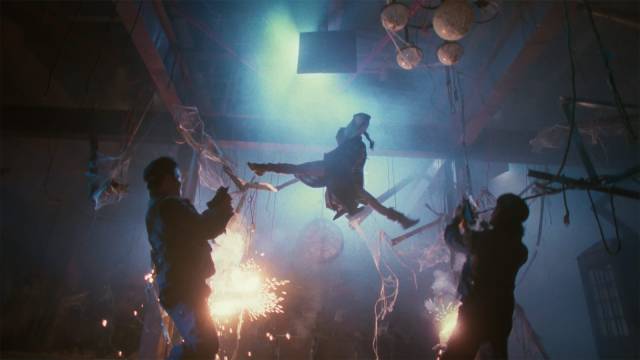
The Heroic Trio was immediately followed by Executioners (also 1993), which is very different in tone, if anything even darker. Again co-directed by Johnnie To and Ching Siu-Tung, with a script by Sandy Shaw and Susanne Chan, the sequel discards the Chinese fantasy elements of the original and replaces them with dystopian science fiction, a belated entry in the post-Mad Max post-apocalypse genre. A nuclear explosion has left the city ruined and contaminated; fresh water is in short supply and what there is is controlled by a corporation run by a badly scarred megalomaniac named Mr. Kim (Anthony Wong) who is in league with an ambitious Colonel (Paul Chun) planning a military coup against the President (Shan Kwan).
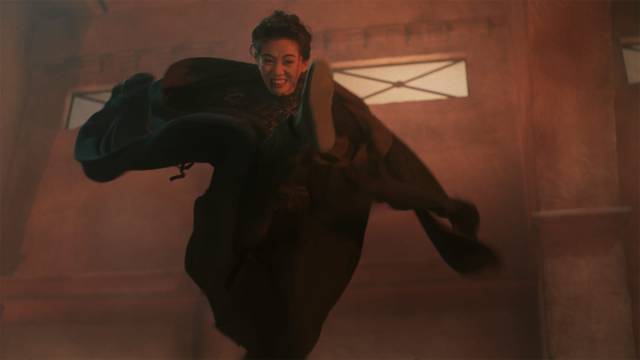
Under pressure from her husband (Damian Lee), Tung (Anita Mui) has abandoned her superhero persona and settled down as wife and mother to their young daughter. Ching drives medical supplies for the authorities with the help of Kau (Anthony Wong again) who was left seriously deformed after falling into a reactor in the first film, and is now fiercely loyal to Ching. Chat is still a mercenary, raiding water supplies and capturing fugitives.
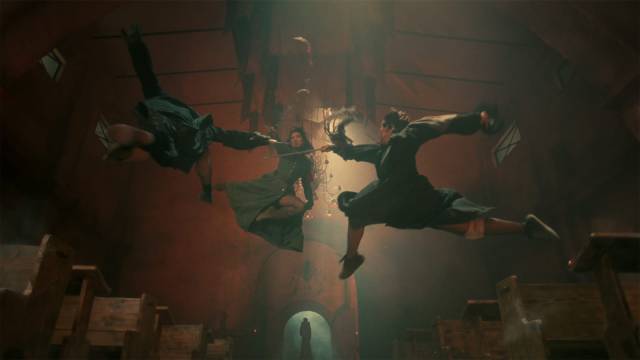
Rebel forces rally behind Chong Hon (Takashi Kaneshiro), who is unwittingly being manipulated by Mr. Kim to create the unrest which will justify the Colonel’s coup. When a rally turns violent, Chat captures a gunman a little too easily and is responsible for the deaths if both Chong and Inspector Lau, something for which Tung can’t forgive her. Conflict once again separates the three women as they fight against the coup, try to protect the President and also locate a clean water supply to break the corporation’s hold on the oppressed population.
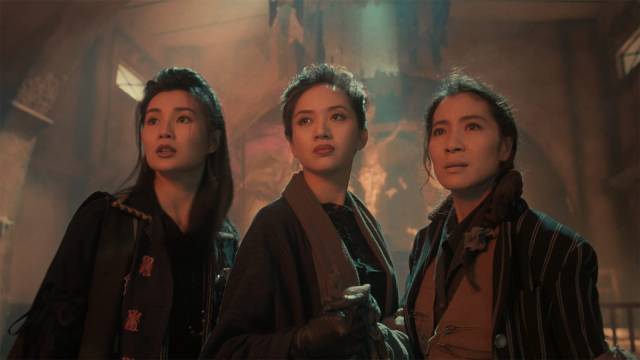
The political corruption and violence clearly suggest anxiety about the approaching transfer of power and fears of what life under the Communist regime might be like, here pushed to grim extremes. The fight against the military and Mr. Kim’s corporation exacts a heavy toll and requires painful sacrifices. And that burden falls squarely on the three women as men prove to be either outright evil or completely ineffectual.
At the time of their release, The Heroic Trio and Executioners were not a popular success – their mixture of eastern and western influences and their darkness proved confusing to audiences – but they eventually gained a cult following, both for those very reasons and for the centring of the three stars with their different styles and personalities. The apocalyptic vision of a city facing a grim past and an uncertain future sets the two movies apart from most of their contemporaries, which either aimed for something more realistic (like the Infernal Affairs trilogy) or settled for a more pleasing fantasy past.
*
The disks
Criterion’s three-disk, dual-format edition has both films on one 4K UHD disk and each film separately on its own Blu-ray. The restorations by L’Immagine Ritrovata are a vast improvement over previous editions, with vibrant colours, excellent contrast and a lot of fine detail in the image.
The supplements
Extras are a little skimpy. The first disk includes an interview with critic Samm Deighan (17:53), who’s an enthusiastic admirer of the films, plus a trailer (2:53), while the second disk has a very brief interview with Anthony Wong about his career and his parts in the two films (7:05), as well as a trailer (3:03).
The insert contains an essay by critic Beatrice Loayza.
Comments